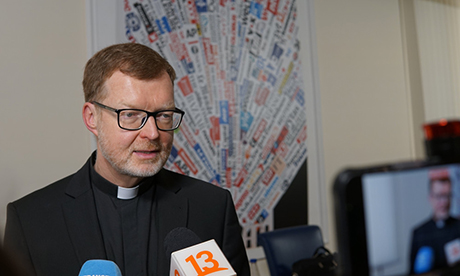The pope’s safeguarding commission must not merely be engaged in “PR”, but become a refuge for those abused by clergy and silenced by the church, says top anti-abuse expert Jesuit Fr Hans Zollner (pictured).
As the commission moved into a palace in Rome’s historic centre, Zollner expressed his hope that the commission’s new home will push the commission to take seriously the principles of transparency, compliance and responsibility.
“It was not easy for me at all to leave the Pontifical Commission for the Protection of Minors and to publicly address the existing problems,” he said.
“Many times, I asked myself the following questions: Does this gesture correspond to the team spirit and the discretion necessary for any working group? Will I hurt the Holy Father with my decision?”
Zollner said he experienced “weeks and months of internal tension to find the right answer to these questions” before finally deciding.
After nearly ten years of serving on the pope’s advisory body, Zollner said, “it is a continuous impression on the part of victims that they are not listened to.”
Without naming individuals, he said there are people in the church who “for personal or emotional reasons, create obstacles” in the fight against abuse.
Zollner cited “structural and practical issues” with the commission when he resigned.
The commission, established by Pope Francis, is currently composed of about 20 members.
Its primary objective is to advise the Pope on the best approaches for safeguarding minors and vulnerable adults, and promoting local accountability within specific churches.
Zollner is not the first member of the papal commission to resign.
In 2017, two prominent members who were abuse survivors left the commission.
The first was Marie Collins, who, in an exclusive article for National Catholic Reporter, cited “resistance,” “reluctance” and a “lack of cooperation” from the then-doctrinal congregation.
Then Peter Saunders also resigned.
Saunders said he was frustrated with the pace of change and “disappointed” the commission was not doing what he thought it was intended to achieve.
Zollner clarified that his resignation was not intended to personally attack anyone or impede the work of the commission, which he called “a success in itself and a great idea by Pope Francis” and one that has an “intrinsic value.”
“I’ve seen with my own eyes how Pope Francis takes his time and listens to victims, and he is an example of the attitude that the church must have,” including its bishops, clergy and laypeople who “don’t always want to listen.”
Yet he acknowledged that “many victims no longer expect anything” from the church. Still, others hope to “just once meet the human face of the church.”
“For me, the greatest pain is that they don’t find it,” he said. “If the church doesn’t serve the last, the forgotten, the wounded, then it makes no sense.”
Sources
Additional readingNews category: World.




